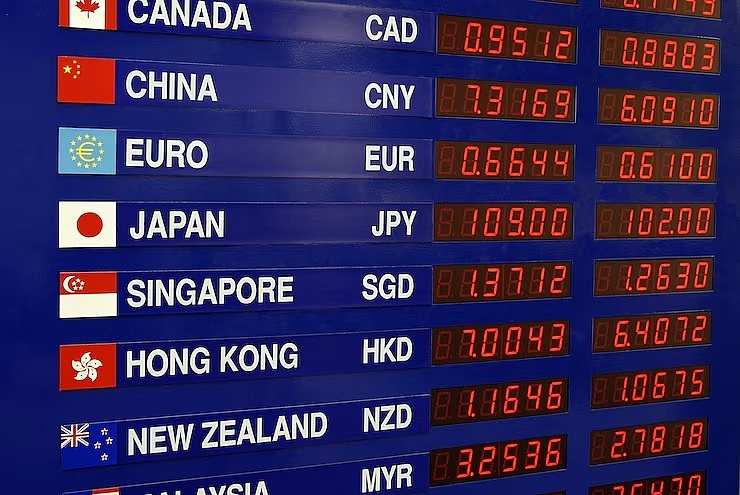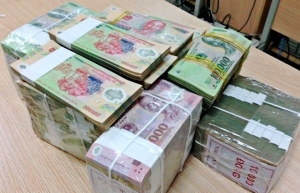Exchange rates hover near historical highs
According to an SSI Research study last week, domestically, the USD/VND exchange rate exhibited divergence across different markets. The interbank exchange rate rose by 0.1 per cent, closing on March 29 at 24,790 VND/USD - a 2.15 per cent increase since the end of 2023, and just 0.3 per cent below the historical peak. The exchange rates listed by Vietcombank and in the informal market are also oscillating near historical highs.
 |
| Exchange rates hover near historical highs, illustration photo/ Source: freepik.com |
“Despite positive trade balance and foreign investment disbursement figures for March, the exchange rate trend has been less favourable due to strong international market pressures. The State Bank of Vietnam (SBV) may need to implement more vigorous measures to cool the demand for USD,” SSI highlighted.
Reflecting on 2023, SBV Deputy Governor Dao Minh Tu described the exchange rate dynamics as “highly volatile,” attributed to the challenges posed by global economic policy shifts directly impacting Vietnam, especially in the trade sector.
Entering 2024, exchange rate concerns have persisted. According to Tu, a significant factor contributing to this trend is the Fed’s ongoing ambiguity regarding monetary policy easing and interest rate cuts, which has recently bolstered the US dollar considerably. This surge has affected the valuation of global and regional currencies, including VND.
“Moreover, the SBV has observed an increased pressure on the exchange rate due to Vietnam’s reduced interest rates, further exacerbated by a negative interest rate differential between the USD and VND in the interbank market,” Tu said.
In the last 20 trading sessions on the Ho Chi Minh Stock Exchange up to April 3, foreign investors have net sold approximately VND14.3 trillion ($595.8 million), and one of the key reasons identified by experts is the significant pressure from the exchange rate.
“To prevent devaluation of their USD-denominated investments, they have opted to withdraw capital from the Vietnamese stock market to preserve investment value and await a more stable exchange rate,” an industry insider told VIR.
“The strategic retreat by foreign investors from Vietnam’s stock market is primarily a defensive move to shield their investments from exchange rate volatility. In light of the current financial climate, preserving capital has taken precedence, with a keen eye kept on the exchange rate for a potential re-entry point,” he added.
The expert also stated that Vietnamese companies engaged in export and import operations possess the advantage of minimising exchange rate risk, courtesy of their stable foreign currency cash flows, which facilitates the strategic retention of funds for debt servicing.
Tu of the SBV assured, “The SBV’s management ensures that the current exchange rate maintains stability and secures a healthy foreign exchange market.”
He also noted that the VND’s depreciation rate against the USD remains modest compared to other major currencies, with a 2.9 per cent decrease in 2023 and a current interbank rate increase of 2.6 per cent. This is relatively low when juxtaposed with the depreciation rates of other key economies against the USD, highlighting the global impact of USD exchange rate fluctuations on these economies.
“The SBV is fully prepared to intervene in the market using our foreign exchange reserves to ensure stability. It’s vital for both the public and businesses to understand that exchange rate management is central to our government’s policy, rigorously managed and controlled. We are dedicated to proactively using our monetary tools to maintain exchange rate stability in the future,” Tu emphasised.
| Nguyen Van Son, analyst, Phu Hung Securities I believe that the consistent net outflows from exchange-traded funds (ETFs), although affected by concerns over the USD-VND exchange rate due to the interest rate gap between the two currencies, have not been significantly impacted by this factor alone. The primary driver for the ETF certificate redemption stems from a shift in investment opportunities, with global capital flows moving towards the US driven by optimism about the economy and in anticipation of the Fed’s shift towards a more accommodative monetary policy. This anticipation is also a key reason why the US stock market has been resilient in recent times. Meanwhile, the significant appreciation of our exchange rate could be attributed to domestic speculative activities. The large interest rate gap stimulates arbitrage trading due to the emergence of uncovered interest rate parity opportunities, along with heightened demand for investment in alternative asset markets such as gold and cryptocurrencies, as well as a resurgence in foreign currency demand for economic activities. To address the exchange rate issue caused by these factors, the SBV has been absorbing liquidity in the open market with the aim of increasing interbank interest rates, thereby narrowing the interest rate gap. Furthermore, the SBV may have also utilised tools to increase foreign currency supply (selling from reserves) to meet the demand for investment activities. The SBV’s market regulatory activities are expected to yield more discernible results in the upcoming net absorption sessions. I anticipate that the volume of net absorption this time may not be as substantial as the cycle in September of last year. |
 | Exchange rates set to put pressure on bank lending Exchange rate pressures will hinder the declining trend of interest rates in the near future, though when compared to other economies, the devaluation of the VND remains under control. |
 | Vietnamese businesses grapple with surging exchange rates Surging exchange rates spark investor caution as the Vietnamese dong's sharp rise against the US Dollar imposes wide-ranging impacts on businesses. |
What the stars mean:
★ Poor ★ ★ Promising ★★★ Good ★★★★ Very good ★★★★★ Exceptional
Related Contents
Latest News
More News
- Banking sector targets double-digit growth (February 23, 2026 | 09:00)
- Private capital funds as cornerstone of IFC plans (February 20, 2026 | 14:38)
- Priorities for building credibility and momentum within Vietnamese IFCs (February 20, 2026 | 14:29)
- How Hong Kong can bridge critical financial centre gaps (February 20, 2026 | 14:22)
- All global experiences useful for Vietnam’s international financial hub (February 20, 2026 | 14:16)
- Raised ties reaffirm strategic trust (February 20, 2026 | 14:06)
- Sustained growth can translate into income gains (February 19, 2026 | 18:55)
- The vision to maintain a stable monetary policy (February 19, 2026 | 08:50)
- Banking sector faces data governance hurdles in AI transition (February 19, 2026 | 08:00)
- AI leading to shift in banking roles (February 18, 2026 | 19:54)

 Tag:
Tag:



















 Mobile Version
Mobile Version